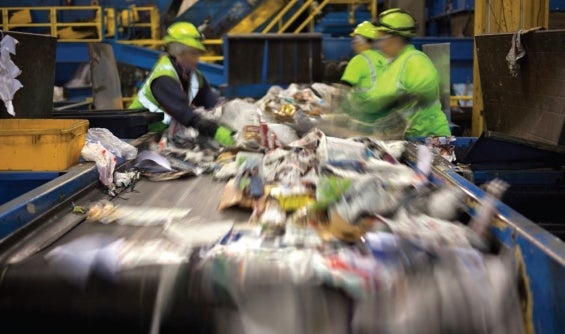Headline News | Press Releases
New Report: U.S. Recycling Workers Exposed to Safety Hazards and High Injury Rates

[BERKELEY, CA:] A new study, released Tuesday, June 23 by environmental, occupational safety, and community benefits experts in collaboration with researchers at the University of Illinois School of Public Health, finds that recycling work is unnecessarily hazardous to workers’ health and safety. Seventeen American recycling workers died on the job from 2011 to 2013. Recycling workers are more than twice as likely to be injured at work as the average worker.
By ensuring health and safety compliance across the industry, the study’s authors say cities can create good and safe recycling jobs, and they offer concrete policy recommendations for cities.
“Recycling is the right thing to do, but we have to do it the right way,” said Mary Vogel, executive director of the National Council for Occupational Safety and Health. “That means educating and empowering recycling workers, and using proven prevention strategies which we know will reduce exposure to hazardous conditions. That’s how we can avoid tragedies like the death of a recycling worker just last week in Florida.”
Key findings from the report, Safe & Sustainable Recycling: Protecting Workers who Protect the Planet, include:
● The industry’s high injury and fatality rates are a result of unsafe working conditions around heavy machinery and exposure to hazardous items on the sort line, like hypodermic needles, toxic chemicals, and animal carcasses.
● Many waste and recycling companies rely heavily on temporary workers, who have fewer workplace protections and are less likely to be informed of their legal right to a safe and healthy workplace.
“People put dangerous stuff in recycling bins,” said Mirna Santizo, who worked at a Casella recycling facility for 12 years, sorting recycling from Boston and other cities. “We found lots of broken glass and needles. Sometimes workers were punctured and hurt from the needles.”
“If we are serious about solving the world’s ecological crises, we need to invest in protecting the lives and livelihoods of workers whose daily efforts are reducing pollution, conserving precious resources, and mitigating climate change,” said Monica Wilson of GAIA, a contributor to the report.
To create good and safe recycling jobs, the authors recommend:
· City governments evaluate the health and safety records of recycling companies and require these companies to have comprehensive worker safety programs,
· The recycling industry ends the use of temporary workers, and
· Cities enact strong community education programs for greater household separation of waste to minimize dangerous contaminants entering the recycling stream.
The report notes that unionized workers, with negotiated contracts in place enjoy more effective enforcement of legally mandated health and safety protections and also have the ability to bargain for additional safeguards to improve working conditions.
“Many cities have figured out how to collect recycling in ways that help our environment, and create good, safe jobs. It’s time to extend that approach to every city, and to every step of the recycling chain, starting with recycling sorting facilities,” said Hays Witt with the Partnership for Working Families, a report contributor.
Since this report went to press, a Florida man was crushed to death on June 15, 2015 in a cardboard compactor while working at a recycling plant in Winter Garden, outside of Orlando.
“Safe and Sustainable Recycling” is being released today with events in 10 cities. The report notes important economic and climate benefits from expanding recycling nationally, including climate benefits equivalent to shutting down one-fifth of U.S. coal power plants and sustaining a total of 2.3 million jobs. That is more than 10 times the number of jobs than sending the same material to garbage incinerators and landfills.
###
“Safeand Sustainable Recycling” is released by:
GAIA a worldwide alliance of more than 800 grassroots groups, non-governmental organizations, and individuals in over 90 countries whose ultimate vision is a just, toxic-free world without incineration. no-burn.org
Partnership for Working Families is a national network of leading regional advocacy organizations. Together we are a voice for working families, promoting policies that create quality jobs and thriving, healthy communities. forworkingfamilies.org
National Council for Occupational Safety and Health (National COSH): National COSH links the efforts of local worker health and safety coalitions in communities across the United States, advocating for elimination of preventable hazards in the workplace. coshnetwork.org.
Authors include experts at the University of Illinois, Chicago Hospital and Health Sciences System and Massachusetts Coalition for Occupational Safety and Health (MassCOSH).